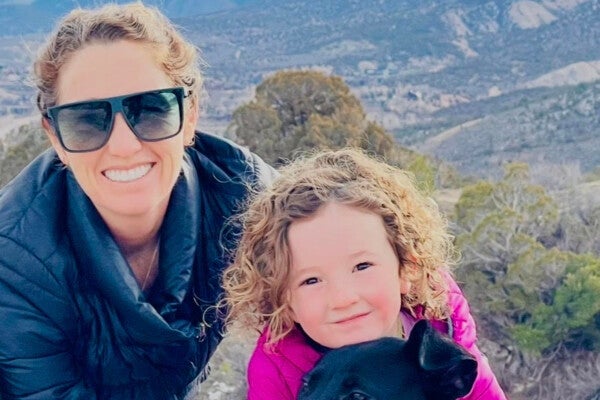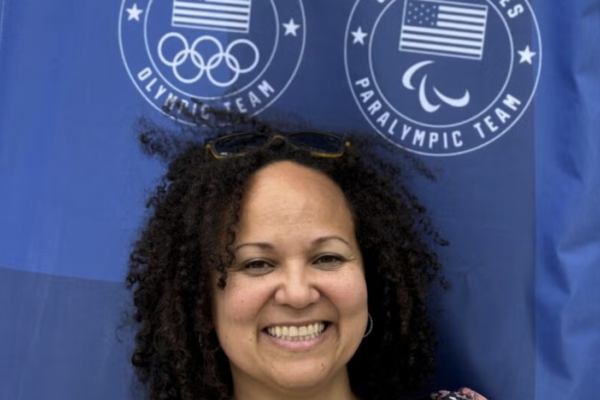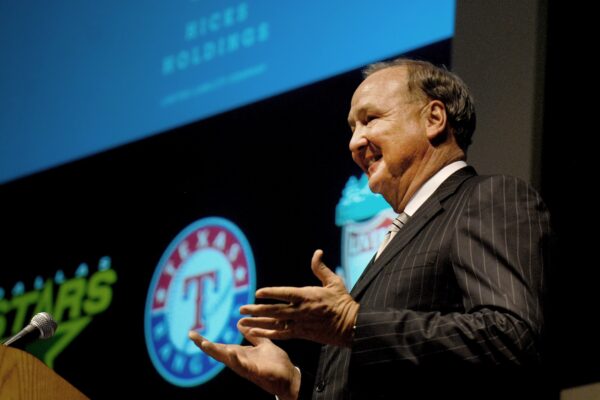Meet the Mulvas
Namesakes Of Future Undergraduate Building Are Driven By Family, Faith, And Community
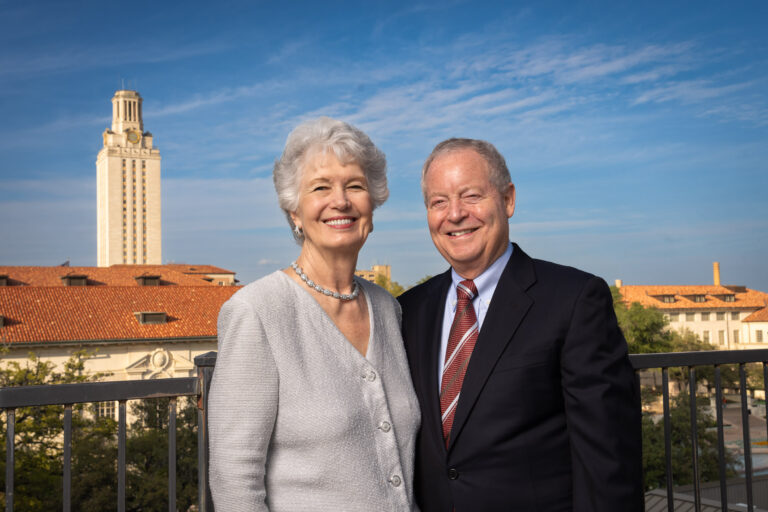
A DECADE AGO, WHEN MIRIAM AND JIM MULVA PLEDGED $40 million to transform undergraduate education at Texas McCombs, they were fulfilling a commitment to give back to schools and communities that shaped them. Although Jim retired as CEO of ConocoPhillips in 2012, the couple stay as busy as ever with their community and philanthropic initiatives, from medical research to affordable housing.
“I may have retired from ConocoPhillips, but we’re not retired. We just work differently now on philanthropic efforts,” Jim says. Miriam continues, “We are at our desks every day, working to make lives better for those in need.”
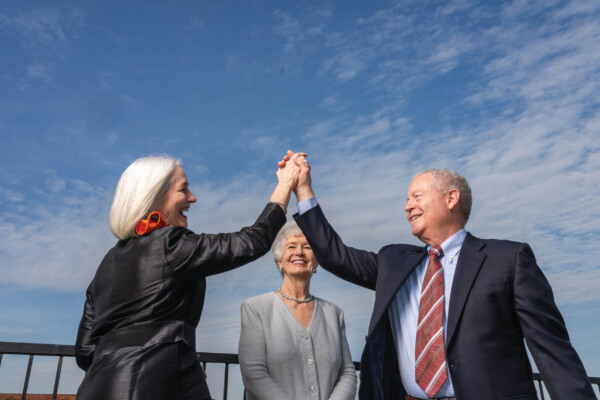
They both grew up in De Pere, Wisconsin, a suburb of Green Bay, and their lives have taken them from Austin to Georgia, Bahrain, and Ohio with the U.S. Navy and then to Bartlesville, Oklahoma, London, and Houston with Phillips Petroleum and ConocoPhillips. They maintain strong ties to many of those communities. Most recently, they oversaw the building and opening of the Mulva Cultural Center, a world-class exhibition and performing arts space in their hometown of De Pere.
Their Catholic faith and a Midwestern upbringing rooted them in their approach to philanthropy. They were also hard workers and brought discipline to their hobbies. From age 11, Jim grew up flying planes with his father, learning the discipline required for aviation. Miriam was a competitive swimmer, spending hours every day in the pool.
Today, they divide their time between Austin and Wisconsin. Married almost 55 years, they have two sons, Stephen and Jonathan, and four grandchildren. Stephen earned undergraduate and graduate engineering degrees at UT, then a Ph.D. at Georgia Tech. For 15 years, he was on the UT engineering faculty. He lives in Austin with his wife, Megan Markey, who has degrees in engineering and French from UT and an MBA from McCombs, and their daughter Emily. Jonathan, who has a finance degree from The University of Notre Dame, lives in De Pere with his wife, Gaby, who has a marketing degree from the University of Guayaquil in Ecuador, and their three small children. Jonathan is a pilot based in Chicago for United Airlines. The Mulvas are a close-knit family who enjoy sports, flying, and time together.
I imagine Austin is unrecognizable from when you attended UT.
JIM: It’s very different because when I went to school at UT, the tallest buildings were the Tower and the Capitol, and the population of Austin was around 200,000.
You have stayed committed to the places where you’ve lived, contributing generously in Bartlesville, Houston, Austin, and De Pere. Was giving back to the community instilled in you from a young age?
MIRIAM: Yes, my parents were quite a bit older when I was born, so most of my relatives were elderly. We spent many weekends visiting those who were not well. I grew up with the importance of always trying to help those in need. My dad had a snowplow on his truck, so he would always plow out all the driveways of neighbors who were elderly. Our family was very service-oriented.
JIM: My father was a small-town banker, so he was always involved — from city councils to education to helping people. There was a lot of discipline — and accountability. From the Christian point of view, we take a view that what we have is not really ours — it’s what you do with it, and in a very simple way someday we do believe we’re going to be held accountable. What did you do with what you had? Did you hoard things, or did you try to help people? It was fundamentally ingrained in us to work hard and to give back.
Jim, did you have any experiences from your business career that shaped your ideas on education and philanthropy?
JIM: I’ve had a few mentors. My dad was killed flying an airplane at the age of 57. I had a mentor who hired me at Phillips, mentored me and became like a second father. He was all about giving back. That was pretty important.
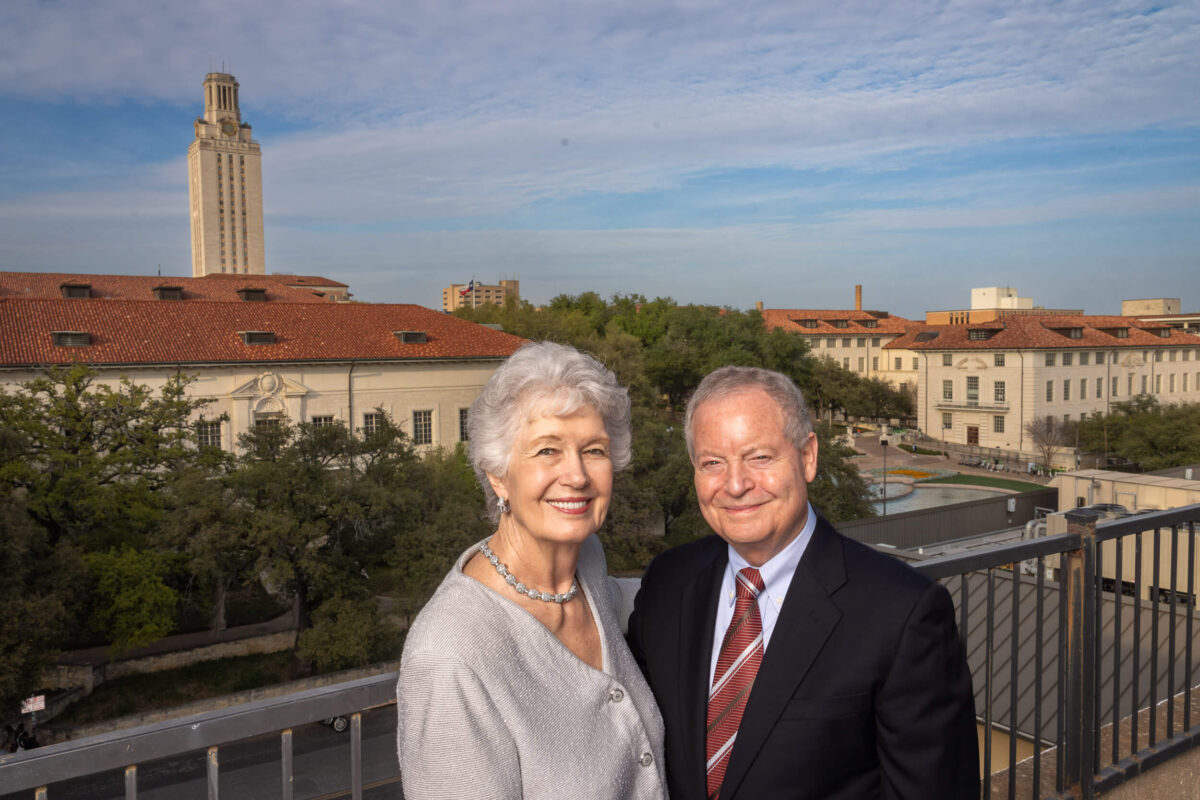
Who in your own life instilled your commitment to education?
MIRIAM: My degree is in elementary education, and education was very important in our family. My mother was 17 when she went off to Fond du Lac, Wisconsin, to board at Saint Mary Springs Academy, which was 55 miles away. This was 1927, and she would have to stay there the whole year, because it was considered too far away to go back and forth for holidays. Getting an education was very important to her; she was valedictorian of her high school class and an accomplished pianist.
JIM: My father was an incredible disciplinarian. We had to do well in school, and there’s no doubt about it — you had to go to college and get a good job. It was all about discipline, structure, and accountability in our family.
You both have interesting passions that you’ve passed on to your families. How did you spend your time growing up?
MIRIAM: At the age of 11, Jim started flying with his dad, who was a World War II flying instructor. Jim soloed on his 16th birthday and has had a lifelong love of flying. I was swimming up to 10 miles a day; it was a big part of my life.
JIM: Miriam won’t tell you this, but in high school, she held several swimming records in Wisconsin and later was a referee and official with Phillips Splash Club when our sons swam.
MIRIAM: I like competition. I like to see how good I can be by putting the time into it. I like the friendships I’ve made. In the summers between college, I lifeguarded and taught swimming, diving, and synchronized swimming. That’s where I met Jim. He came to the pool with his younger brother even though he doesn’t like to swim. I was lifeguarding and the rest is history!
What’s your advice to young people starting out their careers?
JIM: Don’t get hung up with making money and getting promoted quickly. Concentrate on learning how capitalism works and how it can help society, jobs, and growth. Learn how money can impact people, how things get built, how it funds technology, and how it improves life — but never compromise your ethics.
MIRIAM: Being humble is important too. I think there are too many people who are all about themselves. They are not our kind of people. We always remember what Jim’s mentor told him. He said to keep your head down and work hard. Don’t worry about what other people are doing and who is getting ahead. If you just work hard and do your job, you will be treated fairly.
About this Post
Share:
